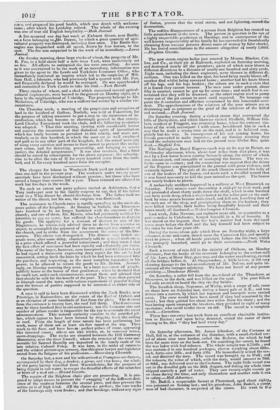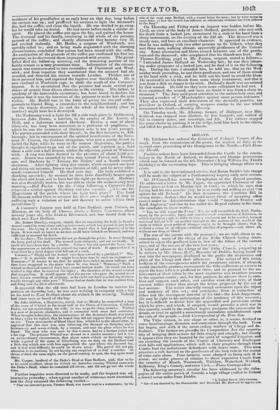On Saturday afternoon, Mr. James Gleadow, of the Customs at
Hull, fell in, at the entrance of the Humber, with a small-decked vessel of about nine tons burden called the Reform, for which he had been for some time on the look-out. On searching the vessel, he found ghe was laden with leaf-tobacco. The whole weight was 4,7101b. • and was contained in one hundred packages, eleven weighing about &As. each, forty-nine 50Ib., and forty 401b. He immediately seized the vessel, and detained the men. The vessel was brought up to Hull; and the tobacco, the value of which, with the duty, would amount to 700/. or SOW., was delivered over to the Customs. The tight little vessel Was out in the dreadful gale on the 30th August, and daring the whole time shipped scarcely a pail of water. They saw twenty-eight vessels go on shore during the time, and only themselves and another rode it out in safety.—Hu/I Advertiser.
Mr. Bodell, a respectable farmer at Plumstead, aged about .eighty was poisoned on Sunday last ; and his grandson, John 13odell, a youny i e man of bad character, s suspected of the crime. He Went to tEe
residence of his grandfather at an early hour on that day, long before the servant was up; and proffered his services to light the deceased's fire, boil the coffee, and clean the hearth. He was desired to go away, but be would take no denial. He had never before made a similar request. He placed the coffee-pot upon the fire, and quitted the house. The deceased and his family, consisting in the whole of six persons, partook of the cofihe; and shortly afterwards they became very ill, and retched violently. Mr. Butler, a surgeon of Woolwich, was speedily called in; and on being made acquainted. with the alarming circumstances, concluded that poison had been mixed with the coffee. An analyzation of the grounds of the coffee-pot confirmed his first impression, as he discovered them impregnated with arsenic. The grandfather died the following morning, and the remaining portion of the family remain in a very precarious state. Information of the circumstance was communicated to two constables of Plumstead and Woolwich ; and from inquiries they ascertained that the accused had absconded, and directed his course towards London. Thither one of them pursued him, and captured the fugitive near Smithfield. He is now confined in Woolwich cage, to abide the result of the Coroner's inquest. It is ascertained that the prisoner had made several purchases of arsenic from divers chemists in the vicinity. His father, in speaking of the lamentable occurrence, has been heard to declare his opinion that it was the intention of the prisoner to make him the next victim. Mr. Bodell was in the habit of giving his tea and coffeegrounds to Daniel Bing, a rateatcher in the neighbourhood ; and bet for the timely discovery, he and the whole of his family (four in number) might have been destroyed.
On Wednesday week a fight for 101. a-side took place in Holderness, between John Brown, a butcher, in the employ of Mr. Lovitt, of Hull, and a fisherman named Hackney. Brown, a man of about thirty-six, has long been notorious as a professor of pugilism ; in which he was the instructor of Hackney who is ten years younger. The parties proceeded with their friends, in the first instance, to Aidborough; but in consequence of the spirited interference of the Reverend W. Craven, the resident clergyman, who sent a young friend to forbid the fight, while he weneto the nearest Magistrate, the parties thought it expedient to go out of the parish, and repaired tu a field about a mile and a half distant, within the adjoining parish of Witherawick. A ring was there formed in the presence of about 1,500 persons. Brown was seconded by two men named Forsey and Thompson, and Hackney by " Tommy the Natilor," and a South country showman. After fighting sixty-five rounds, which occupied one hour end thirty-six minutes Brown was thrown or fell ; and he never after
wards recovered himself. He died next day. His body exhibited a shocking spectacle ; he seemed to have been dreadfully beaten upon the chest and head, and to have had the right eye destroyed. Hackney was also dreadfully beaten, but was able to claim the stake-money next morniug.—Hall Packet. On the Friday following, a Corona's Jury retueced a verdict against Hackney and two seconds. [Wito are the Magistrates of the parish where the li„,-ht took piece ? lies Lord Melbourne called them to account for thvir rus s neglect of duty in suffering such a violation of law and decency to occur lvithin their jurisdiction?] A Coroner's Inquest was held at East Bedfunt, near Staines, on Monday, on the body of Thomas Mark, a King's l'.'aterinan, about seventy years old, who lived at Richmond, and was found dead iii a ditch near East Bedfont.
Mr. Robert Huntley, surgeon, stated, that on examining the body he found a wound caused by some sharp cutting instrument, which had passed in just below the nose. On trying it with a probe, he found that it had penetrated to the brain. It was such an injury as no mau could have inflicted on himself, and was sufficient to account for death.
By the Jury—The instrument did not go through the palate. It went through the bony part of the skull. The wound went obliquely, and not vertically. It could not have been done by a bullet. Witness has not opened the head, since the appearances so satisfactorily proved the cause of death. It appeared as if it were Mole by a short dagger that fell out of a stick.
Corouer—" Might not the wound have beam caused by a pitchfoik.?" Witness—" It is possible that it might have been dune by such an iu-trainent." Foreman—" It occurs to me that he might have fallen on some railingS, and then have staggered to the place where he was found." Witness—" Such a wound as deceased received must have caused instant death. He could mot have walked a step after he received the injury ; the direction of the wound refuted that supposition. It would appear that the person who gave the wound must have known something of anatomy, as he could not have reached the brain so readily through any other part." Witness had no doubt that he was stabbed first, and flung into the ditch afterwards.
It appeared that the old man had been to London to receive his pension on Saturday last; he was seen walking in company with a boy on his road to East Bed font about six o'clock in the evening. Nobody had since scent or heard of the boy.
Sir John Gibbon, a Magistrate, stated, that on Monday he committed a man of the name of Mina] to the tread-mill at the House of Correction, Coldhath Fields, formot maintaining his wife; he wan to go for three month& Vs hival is a new of desperate character, and is connected with some bad associates. When brought before him, the circumstance of the deceased's death was stated to him; when he replied, that he hoped they did not suppose him guilty of such an act. There were marks of blood about him, which led to the observation. It appeared that this man was seen following the deceased on Saturday night, between she and seven o'clock, by a woman, aud near the place where he was
found. The man who was seen by this woman, had on a fustian jacket and a fur cap. The prisoner Whittal was dressed in a similar manner ; and it was
an extraordinary circumstance, that about seven o'clock on Saturday night, while a patrol of the name of Glendining was on duty on the Bedfont road a little dog which was with him approached the spot where the deceased lay, and it was with difficulty he could be drawn away. The patrol did not pay
attention to its motions, he not having any suspicion of so foul a murder. At eleven o'clock the same night, on the patrol coming to spot, the dog again went there.
Mr. Cooper, landlord of the Duke's Head at East Bedfont, said, that as far as he could recollect, about six o'clock on Saturday evening Whittal came into the Duke's Head, where he remained till eleven, and did not go out the whole time.
Further inquiries were directed to be made, and the inquest was adjourned to yesterday; when a great number of witnesses were examined, and the Jury returned the following verdict
.' That the deceased person, Thomas Monk, was found dead in a watercourse, by the
side of the road, near Bedfout, with a wound below the nose', but by what means ha came there, or how the wound with inflicted, no satisfactory evidence has been adduced to the Jury."
On Thursday and Friday week an inquest was holden before Mr. Cecil, on view of the body of James Holland, gardener, who met with his death from a locked Jaw, occasioned by a stab in his hand from a sharp instrument, on the evening of the 23d ult. The deceased was a steady man, and bore an excellent character. It appeared in evidence, that he was walking with two other persons up St. Giles's, when they met three men, walking abreast, apparently gentlemen of the Univen. say. Some altercation and blows ensued between one of the gentle.. men and the deceased ; who complained that his thumb was hurt. Mr. Thomas Embling, pupil to Mr. Paxton, surgeon, stated as follows" I attended James Holland on Wednesday last ; he was then labour. ing under symptoms of a locked jaw, and he died of it on the following day. During the time I attended him, he told me, that on the Wed.. nesday week preceding, he met three gentlemen, and one of them struck at his head with a stick, and he held out his hand to avoid the blows He received it on his thumb from some sharp instrument, and that it was from a dirk or dagger in the stick. Holland's death was occasioned by that wound. He told me they were some collegians he had met. I have examined the wound, and have no doubt it was from a sharp in. strument." The Jury paid great attention to the melancholy case, and returned a verdict of " Manslaughter against some person unknown." They also expressed their detestation of the dastardly practice, too prevalent in Oxford, of carrying weapons similar to the one which occasioned his death.—Reading Mercury.
On Tuesday week, Mr. Alloway, fitriner, of Holyport, near Maidenhead, was stopped near Marlow, by five footpads, and robbed of 951. in country notes, one sovereign, and 12s. The robbers stopped the pony-chaise by pushing it in the hedge, held hint back in the chaise, and rifled his pockets.—Bachs Gazelle.





















 Previous page
Previous page